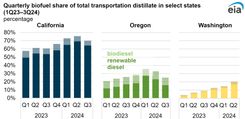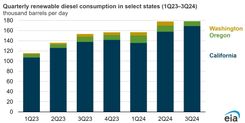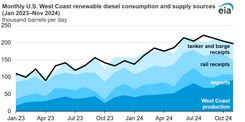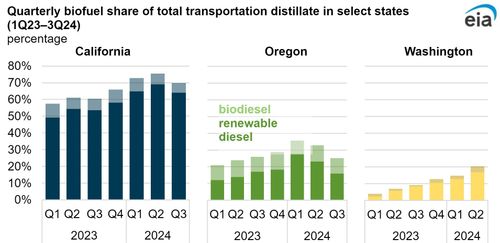EIA: Consumption of renewable diesel continues general growth trend on the US West Coast




Data source: California Air Resources Board, Oregon Department of Environmental Quality, and Washington Department of Ecology
February 20, 2025
BY U.S. Energy Information Administration
Renewable diesel is increasingly replacing petroleum diesel on the U.S. West Coast, where state-level policies are attracting new production capacity and shipments to the region. The fuel continues to mostly be consumed in California but is also making up a substantial share of Oregon’s and Washington’s smaller distillate pools, according to quarterly data published by California, Oregon, and Washington.
Renewable diesel is a transportation and heating fuel that is chemically equivalent to petroleum-based distillate and is produced using fats, oils, or greases rather than petroleum. Although some renewable diesel is consumed in other regions, such as the U.S. East Coast, the fuel is primarily consumed on the West Coast because California, Oregon, and Washington have active clean fuel programs that incentivize its consumption.
Advertisement
Advertisement
West Coast renewable diesel consumption has approximately doubled since the first quarter of 2023 (1Q23), with increased domestic production supplying most of the growth. Much of that production growth has come from California, where Marathon’s Martinez plant and Phillips 66’s Rodeo plant have added new capacity. Most of the remaining growth has come from increasing production in other parts of the United States, where renewable diesel plants are commonly producing fuel to ship to the West Coast via rail, tanker, or barge.
In November, the most recent month for which we have historical data, renewable diesel production on the West Coast totaled more than 90,000 barrels per day (b/d)—almost four times the volume from 1Q23 and making up about 45% of the region’s consumption of renewable diesel. Interregional rail shipments supplied about 20% of West Coast consumption, tanker or barge shipments contributed almost 25%, and the remaining demand was met through imports and inventory draws.
Our analysis of data published by California, Oregon, and Washington suggests most renewable diesel is consumed in California, although consumption is generally increasing in all three states.
Advertisement
Advertisement
More renewable diesel is also consumed in California as a share of all distillate used for transportation. In 3Q24, renewable diesel made up nearly 65% of distillate fuel consumed in California for transportation, a decrease from nearly 70% in 2Q24, and biodiesel made up more than 5%.
In Oregon, biofuels made up about one-quarter of the transportation distillate fuel consumed in 3Q24, with renewable diesel making up about twice the share of biodiesel. Like in California, the share of biofuels in Oregon was down from 2Q24, when biofuels made up one-third of the state’s transportation distillate fuel supply. In Washington, during 2Q24, about 20% of the transportation distillate fuel consumed in the state was biofuels, with more than 15% coming from renewable diesel.
Related Stories
CARB on Feb. 18 announced that amendments to its LCFS program that were approved in November 2024 have been put on hold following the California Office of Administrative Law’s decision to disapprove the amendments due to clarity issues.
The U.S. Department of Commerce’s International Trade Administration on Feb. 12 announced it would postpone a meeting of the Renewable Energy and Energy Efficiency Advisory Committee that was scheduled to take place that day.
The U.S. exported 19,303.6 metric tons of biodiesel and biodiesel blends of B30 or greater in December, according to data released by the USDA Foreign Agricultural Service on Feb. 5. Biodiesel imports were at 97,4200.7 metric tons for the month.
The U.S. Department of Commerce’s International Trade Administration has announced the Renewable Energy and Energy Advisory Committee will hold a meeting Feb. 12 in Washington, D.C. The event will also be streamed online.
Neste is partnering with the Italian fuel distributor Firmin to make Neste MY Renewable Diesel available for the first time in Italy to contribute to the reduction of greenhouse gas emission in the transport sector.
Upcoming Events









